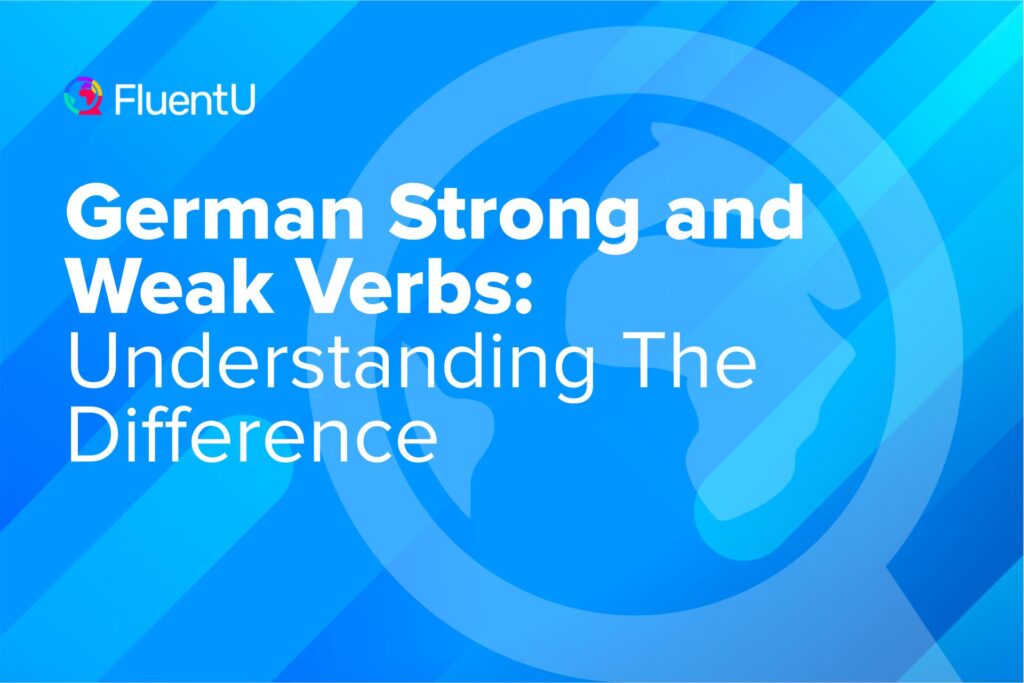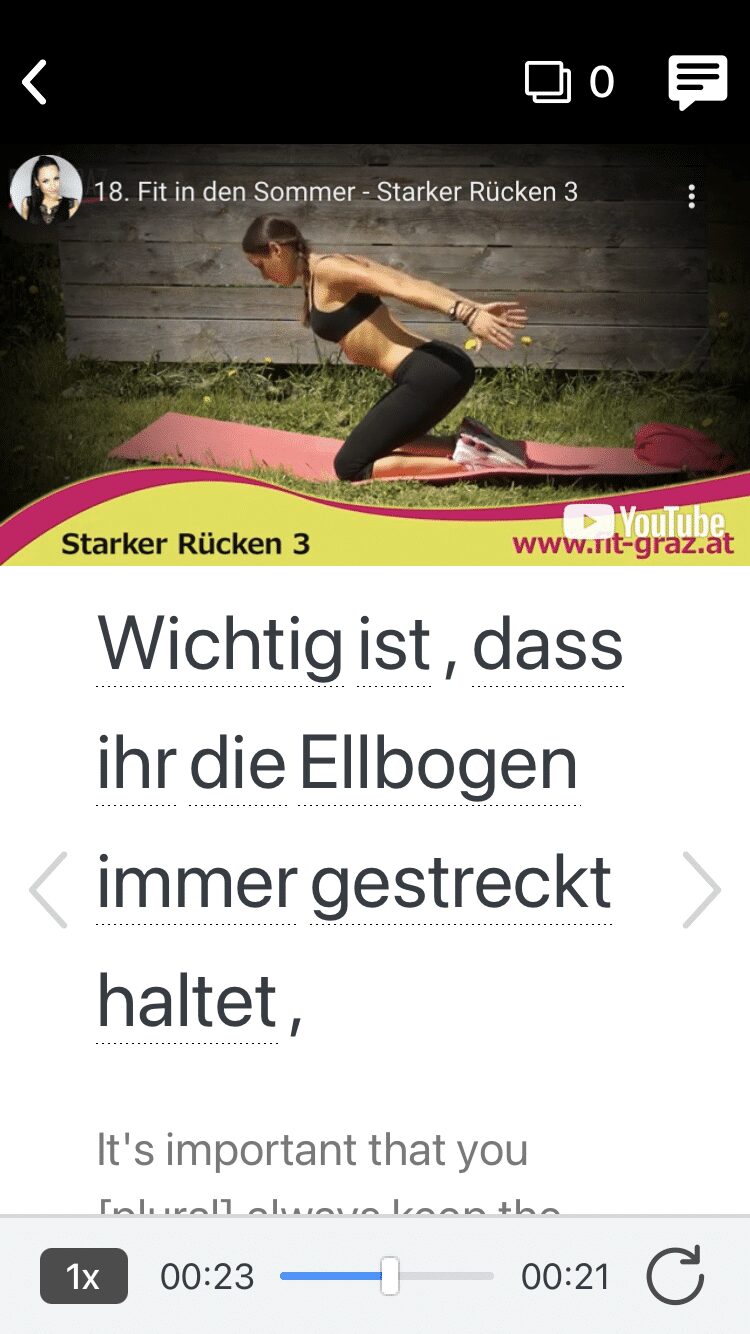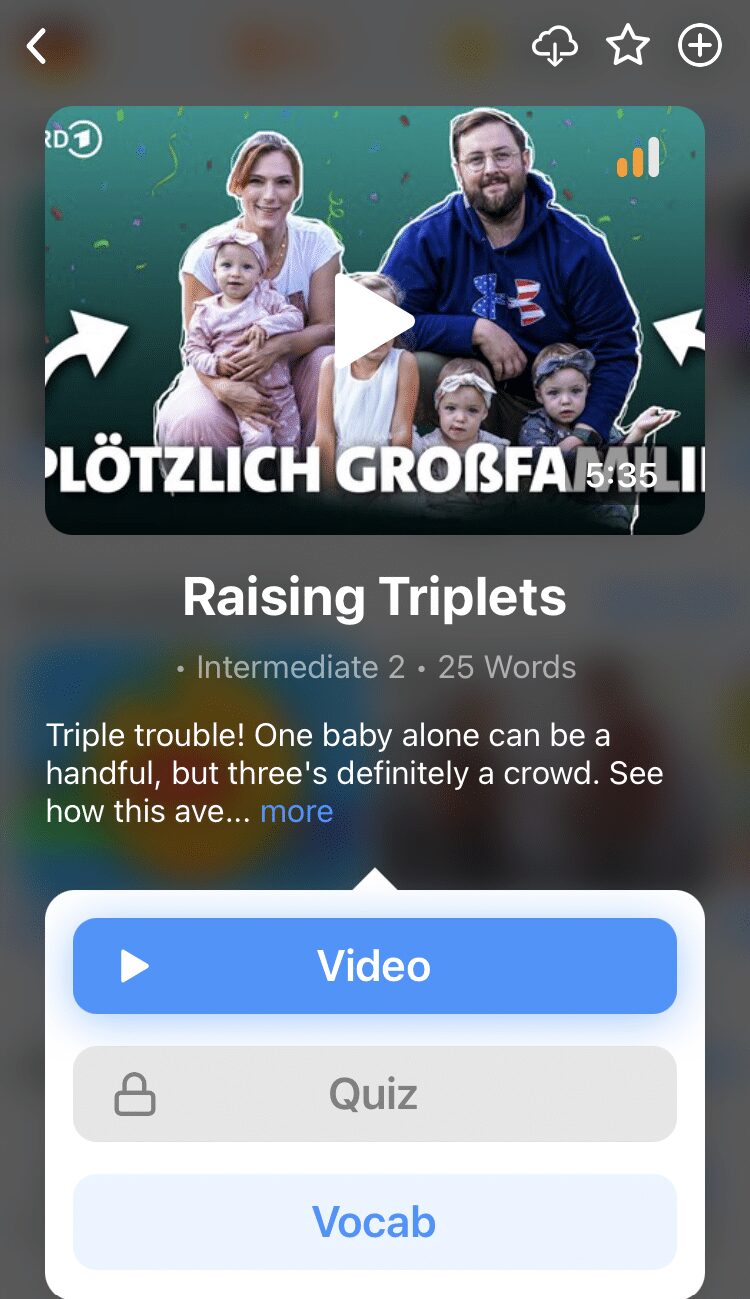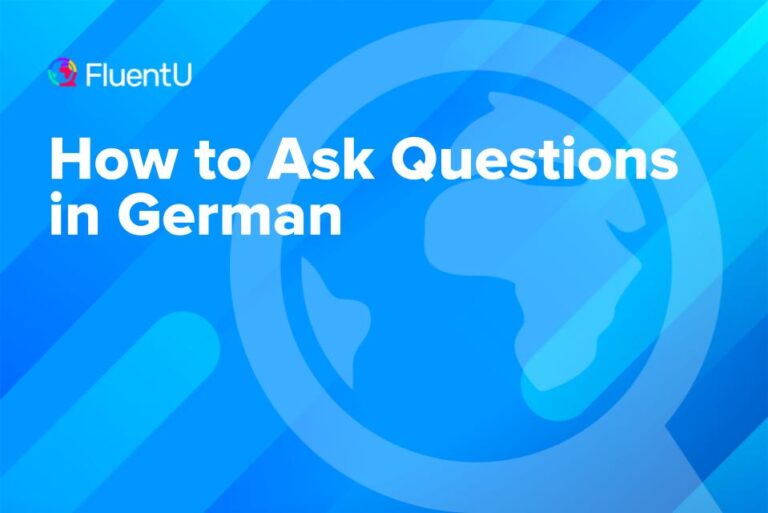German Strong and Weak Verbs: Understanding The Difference

Conjugating German verbs can be a confusing process.
There are two major types: strong verbs and weak verbs, and their conjugation patterns are quite different.
Here’s a basic run-down on how to confidently deal with both verb types.
Download: This blog post is available as a convenient and portable PDF that you can take anywhere. Click here to get a copy. (Download)
What’s the Difference Between Strong and Weak Verbs?
Every German verb consists of two parts: the stem, or Stamm , and the ending, or Endung .
The main difference between strong and weak verbs is what happens to the stem. The most distinct change in the stem is usually in the core vowel.
German weak verbs ( schwache Verben ) are regular in all tenses and conjugations. It’s not clear why the term “weak” is used, but I tend to perceive these verbs as “weak” because they can’t undergo any major changes when conjugated, otherwise they’ll “fall apart” and lose meaning. That is, the stems of weak verbs generally remain untouched.
An example of an English “weak verb” is “to walk.” No matter how you conjugate it in different tenses, the core of the verb is the same: I walk, she walked, they had walked.
Strong verbs ( starke Verben ) are irregular, although not necessarily in every tense or conjugation. The stems of strong verbs undergo a change during conjugation. This is why they’re “strong”: even after the stem change, strong verbs are still recognizable and so they are able to “stand” on their own.
An example of an English “strong verb” is “to swim.” The vowel of this verb changes depending on the tense: I swim, she swam, they had swum. Coincidentally, there are quite a few German strong verbs with English cognates that are also irregular!
Conjugating Weak Verbs
Most German verbs fall under the “weak verb” category. Weak verbs will be your friends because of their very predictable conjugation pattern.
Weak verbs in das Präsens
German weak verbs in das Präsens , or the present tense, are important to mention because they outline the basic conjugation patterns for the rest of the German verbs. As mentioned previously, weak verbs are predictable and learning how to conjugate them doesn’t take much time.
The present tense conjugation for brauchen (to need) and other weak verbs is as follows:
ich brauche (I need)
du brauchst (you need)
er/sie/es braucht (he/she/it needs)
wir brauchen (we need)
ihr braucht (you need)
Sie/sie brauchen (you/they need)
In the present tense, you conjugate the –en ending of the weak verb to match the subject and that’s all there is to it!
Weak verbs in the Präteritum
Das Präteritum , or simple past, is also referred to as the literary past tense in German because it’s typically used in writing. An example in English would be “I wanted.”
Conjugating the Präteritum is more or less the same as the present tense, except for two things: the 3rd person singular (er/sie/es) and an additional “t” at the beginning of all the verb endings:
ich brauchte (I needed)
du brauchtest (you needed)
er/sie/es brauchte (he/she/it needed)
wir brauchten (we needed)
ihr brauchtet (you needed)
Sie/sie brauchten (you/they needed)
Note: Verbs which have a “d” or a “t” at the end of their stem require an extra “e” to be conjugated correctly. Here’s an example with the verb reden (to speak):
ich redete (I spoke)
du redetest (you spoke)
er/sie/es redete (he/she/it spoke)
wir redeten (we spoke)
ihr redetet (you spoke)
Sie/sie redeten (you/they spoke)
Weak Verbs in the Perfekt
The Präteritum is all good and well, but in spoken German, you typically use the present perfect, or das Perfekt , tense to talk about the past. This is an important distinction between German and English: the Präteritum and Perfekt tenses are used identically, whereas the past tense and present perfect in English aren’t.
For example, if we were to directly translate “ er hat geredet “ into English, we’d have “he had talked,” when in actuality a German would interpret that as “he talked.”
The Perfekt is actually the easiest of the three to conjugate for weak verbs, especially if you’ve already learned how to conjugate the two auxiliary verbs haben (to have) and sein (to be):
ich habe gekauft (I bought)
du hast gekauft (you bought)
er/sie/es hat gekauft (he/she/it bought)
wir haben gekauft (we bought)
ihr habt gekauft (you bought)
Sie/sie haben gekauft (you/they bought)
As you can see, to conjugate weak verbs in the Perfekt, you just need to use the verb stem to form the past participle. You add ge- to the beginning of the verb and a -t to the end and you’re finished! (And, of course, include the correct conjugation of one of the auxiliary verbs, haben or sein.)
Note: Verbs that end in –ieren such as telefonieren (to telephone) or have fixed prefixes, such as bezahlen (to pay), only require the –t to form the past participle. For example, with telefonieren:
ich habe telefoniert (I telephoned)
du hast telefoniert (you telephoned)
er/sie/es hat telefoniert (he/she/it telephoned)
wir haben telefoniert (we telephoned)
ihr habt telefoniert (you telephoned)
Sie/sie haben telefoniert (you/they telephoned)
Conjugating Strong Verbs
When I first tried to teach myself German, most of the first verbs I tried to learn were irregular, which made things pretty difficult.
Even though the vast majority of German verbs are weak, many of the important ones are strong. If we were to look at a list of the most common German verbs, we’d see that eight of the top ten (as well as thirty of the top fifty) are strong.
While we were primarily concerned about the verb endings with the weak verbs, with strong verbs we’re more interested in the Stamm.
Strong verbs in das Präsens
Irregular verbs in the German present tense have vowel changes in the second and third person singular (du/er/sie/es) conjugations, and there are three types of changes:
“e” to “i” — ex: geben (to give) to du gibst (you give)
“e” to “ie” — ex: lesen (to read) and er liest (he reads)
“a” to “ä” — ex: fahren (to drive) and er fährt (he drives)
There are a few verbs in the present tense that fall outside of this pattern, such as haben and sein, but not many.
Strong verbs in the Präteritum
The Präteritum is where things get a little messy for strong verbs, but luckily there are still some patterns to pick out.
Strong verb Präteritum endings follow the normal conjugation pattern, except in the first and third person singular conjugations (ich/er/sie/es), where there’s no ending:
Long “e” and “i” sounds change to “o” — ex: bewegen (to move) becomes bewog .
Short “e” and “i” sounds change to “a” — ex: essen (to eat) becomes aß .
Verbs with “ei” change to either “ie” or “i” — ex: schneiden (to cut) becomes schnitt .
Verbs with an “ä” vowel change in the present tense change to either “ie/i” or “u” — ex: laufen (to work or walk fast) becomes lief and fahren (to drive or go) becomes fuhr .
Again, these are just basic guidelines and there will be some exceptions!
Strong Verbs in the Perfekt
When it comes to learning verb tenses, in my experience the strong verb Perfekt tense is the most challenging.
The Perfekt tense has the most given variations, but as with the previous two tenses, there are some patterns to look out for:
Most verbs with “a” and “o” stems remain in the infinitive, ex: fahren becomes gefahren .
Verbs with “ei” change to either “ie” or “i” — ex: beißen (to bite) becomes gebissen .
Verbs with “ie” change to “o” — ex: fliegen (to fly) becomes geflogen .
Verbs with “i” infinitive change to “u” — ex: springen (to jump) becomes gesprungen .
Verbs with “e” typically change to “o” — ex: sterben (to die) becomes gestorben .
As with the previous conjugation patterns, there are going to be exceptions! It’s also worth noting that all of the strong verb participles end in -en, with the exception of tun (to do) which becomes getan .
Whether you plan on using the conjugation patterns or outright memorizing the list of strong verbs, it’s going to take practice and dedication.
Here is a summary of all the verbs mentioned here and how they’re conjugated in the three tenses (based on the er/sie/es articles).
[table “512” not found /]What Are German Mixed Verbs?
There is actually a third category of German verbs: mixed verbs, which are a mix between the other two categories (strong and weak).
In other words, a mixed verb will have a spelling change in the past tense (typically, a vowel change like strong verbs) with normal verb endings (like weak verbs). For example, take the verb brennen (to burn). The third person singular in all three tenses is as follows:
Because mixed verbs can be a bit wonky, I suggest you really nail down the difference between strong and weak verbs before diving into mixed verbs. That way, it’ll make memorizing their specific conjugation rules easier.
Resources for Learning German Verbs
As I mentioned earlier, the bulk of your learning will be based on pure memorization. In my German class, I remember just receiving a worksheet listing out strong verbs that I had to read everyday.
There are comprehensive lists of the verbs online, such as this one for strong verbs. Pay careful attention to those vowel changes.
The process can be made easier by reading German texts in general. It’s important to see the verbs as they’re written so that you can quickly identify their type.
Beginner-level German books were one of the main resources I utilized to get familiar with German verbs. They show how they’re used in context as well, so they’re great in improving your overall speaking and writing skills.
German news websites such as Deutsche Welle and Der Spiegel are also great tools. They’re especially useful for learning the Präteritum and Perfekt forms of verbs, since news articles are predominantly written in the past tense.
There is also FluentU. You can actually look up German verbs and see which type they are, along with examples of how they’re used by native speakers.
FluentU takes authentic videos—like music videos, movie trailers, news and inspiring talks—and turns them into personalized language learning lessons.
You can try FluentU for free for 2 weeks. Check out the website or download the iOS app or Android app.
P.S. Click here to take advantage of our current sale! (Expires at the end of this month.)
Learning how these verbs conjugate adds a layer of polish to your speaking and reading abilities and allows you to communicate more effectively (you don’t have to just rely on gestures).
Conjugating strong and weak verbs is something even advanced German learners still have trouble with occasionally. But constant practice and usage will be the key to mastering them, and the more you continue your German studies, the easier things will get.
Download: This blog post is available as a convenient and portable PDF that you can take anywhere. Click here to get a copy. (Download)
And One More Thing...
Want to know the key to learning German effectively?
It's using the right content and tools, like FluentU has to offer! Browse hundreds of videos, take endless quizzes and master the German language faster than you've ever imagine!
Watching a fun video, but having trouble understanding it? FluentU brings native videos within reach with interactive subtitles.
You can tap on any word to look it up instantly. Every definition has examples that have been written to help you understand how the word is used. If you see an interesting word you don't know, you can add it to a vocabulary list.
And FluentU isn't just for watching videos. It's a complete platform for learning. It's designed to effectively teach you all the vocabulary from any video. Swipe left or right to see more examples of the word you're on.
The best part is that FluentU keeps track of the vocabulary that you're learning, and gives you extra practice with difficult words. It'll even remind you when it’s time to review what you’ve learned.
Start using the FluentU website on your computer or tablet or, better yet, download the FluentU app from the iTunes or Google Play store. Click here to take advantage of our current sale! (Expires at the end of this month.)












